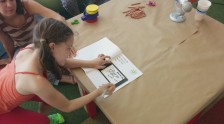Health: How do improve the patient experience?
Adolescent Health Center for Mount Sinai.
We helped Mount Sinai identify opportunity areas that best suit the needs of adolescents, both girls and boys. Few people need help as much as adolescents from low income inner city families. At the same time, they are a hard group to reach because they are sensitive, worried and inexperienced. These teens have medical issues that are compounded by lifestyle problems. Their families often don’t provide enough support and they often don’t have medical insurance. Who can the kids turn to?
Mount Sinai Adolescent Health Center (MSAHC) provides confidential integrated medical services for these kids – for free. MSAHC serves 10,000 teens a year and it serves them well. The Center’s retention rate is far higher than the country average. Still, MSAHC would like to serve the kids even better. However, a hospital is an incredibly complex system. What changes would make the biggest difference?
The Femme Den conducted a design opportunity study forMSAHC. We checked in as patients, shadowed staff, social workers, nurses and doctors, socialized with kids, and ultimately noticed quite a few things that could be improved.
The kids were happiest when they were in contact with a person, be it a medical technician, a doctor or a health educator. In fact, the medical staff went above and beyond their call of duty to help the kids and to make them feel cared for. The doctors went to the teens’ graduation, gave business cards with personal cell phone numbers, tutored teens after school and helped them to write college application essays. In short, they established a relationship built on trust.
The problems arose when the kids were not in contact with a person. We identified six major opportunities to improve the teens’ experience through the whole patient journey.
The most impactful opportunity is to change the AHC brand identity from “crisis” to a “wellness” point-of-view. Teens are nervous and insecure. Visiting the MSAHC is a stressful and shameful experience for many kids. Their friends told them that the Center was a great place to go to if they had STD’s or if they were pregnant. Kids were not aware that the MSAHC offered dental, ophthalmological, nutritional, routine medical and even legal services. Some of the MSAHC’s most thoughtful initiatives were not conveyed and the helpful information was lost through poor communication. And, the MSAHC’s language and tone just didn’t connect with the kids.
The importance of good communication, at every stage, is absolutely critical. Kids must be informed of all the MSAHC benefits beforehand. Kids must be informed throughout their visit. Kids’ shame must be alleviated and their visit should be a positive experience.






